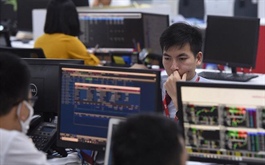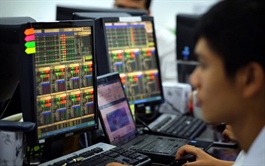New investors must prepare for failure in stock market
New investors must prepare for failure in stock market
More than 2.5 million new investors have jumped into the stock market since April 2020, when the stock market hit the bottom due to the sudden outbreak of the Covid-19 pandemic.
Illustrative photo. |
Since then, this is the first time the market has experienced a steep fall. Stocks plummeted drastically in April, even continuing to fall for many days, and wiping out profits previously earned. Along with disappointment and fear, several investors have raised their voices on forums, asking for solutions to remedy the situation.
Unpredictable outcome
Regardless of age, the experience on the stock market has its own characteristics of having to work to understand it. It is a feeling that goes from glorious victory and standing at the top, to feeling regret and even panic. According to statistics from the Depository Centre, the booming wave of the stock market since the beginning of April 2020 has attracted more than 2.5 million new accounts by March 2022. There will be old investors coming back to the market, but most of these accounts are certainly owned by new investors. Therefore, experiencing the first shock in just around two years is actually very good, because everything must be experienced eventually, and the sooner the better.
If based solely on the VNSmallcap index representing small-cap stocks on the HoSE, the growth from the bottom in March 2020 to the top in early January 2022 is more than 4.1 times or 412%. This is a growth rate that can help many amateur investors become billionaires. Just a month ago, this index dropped about 30% of its value, but the bitter thing for many new investors is that the decline in stock is much larger. In April, HoSE had 208 stocks that lost more than 30% of the value, and the HNX had about 173 shares that fell as well. This statistic is only partially revealed, because depending on the size of the portfolio and depending on the stock code, investors can lose many times more than this. For example, with FLC stock, the loss from the peak is a negative 76.1%, ROS is negative 79.5%, NBB is negative 73.2%, VRC is negative 70.8%, FTM is negative 70.8%, and LCM is negative 70.3%.
Lack of experience in portfolio management can also make investors lose all profits earned during the 2020 to 2021 growth cycle in a few speculative stocks. The 30% drop in the VND 100 million start-up investment capital is much less bitter than the feeling of loss of 30% of the VND 400 million profit. The winning that lasts too long can instigate investors to pledge to get more capital or borrow double margin to hit big. Then the 30% loss could be with VND 800 million or VND 1 billion, or even more.
No support from market
The get-rich-quick aim by investing in stocks can be felt in many places, from friends to co-workers in the office, or even at an iced tea shop. There was a time when taxi drivers and market sellers also opened price lists on their phones to discuss stocks and showed off profits. A clear difference between novice investors and professional investors is that they always find ways to blame their failure on something else or ask for support from a management agency. The last few days on the securities forums were circulating with calls for help to save the market. The shareholders' meetings were full of tension when investors asked business leaders why they let the stocks drop in price, even to the extent that a chairman even advised speculators to divest from the company, to save for long-distance investors. Another president called stock speculators parasitic and unwelcome.
The only time Vietnam's stock market was rescued was in 2009, when the State Capital Investment Corporation SCIC bought shares to curb the decline due to the impact of the world financial crisis. However, at present, Vietnam's stock market has become much more mature, reaching the scale of an emerging market, with foreign investment capital inflow of hundreds of billions of dollars, and no national fund that can rescue it and there is no need to expend resources for that purpose. A sufficiently developed market needs no rescue, as market forces balance themselves out. A drop of 30% to 70% like the new statistics above may be a loss for one person but will be an opportunity for someone else.
In recent days, the market has seen cheap buying cash flow, from both domestic and foreign investors. The simple reason is that the business is still profitable, the economy is still growing, the society is stable, and there is no point in rejecting a stock that has fallen tens of percent in a few months simply out of fear of a disoriented group of investors. The total resources in the market are still the same because the amount of money lost from the pockets of losing investors will flow into the pockets of better investors. Those same coins will come back to salvage the market.
If one considers entering the stock market like a start-up, one needs to know that over 90% of start-ups fail or go bankrupt in the first two years. Therefore, losses in the stock market are completely normal. The difference here is that you must accept that it is inevitable for anyone to fail, and the fault is yours alone. On the other hand, if failure is considered a tutor, then the lesson must be worth it and never be repeated.





























